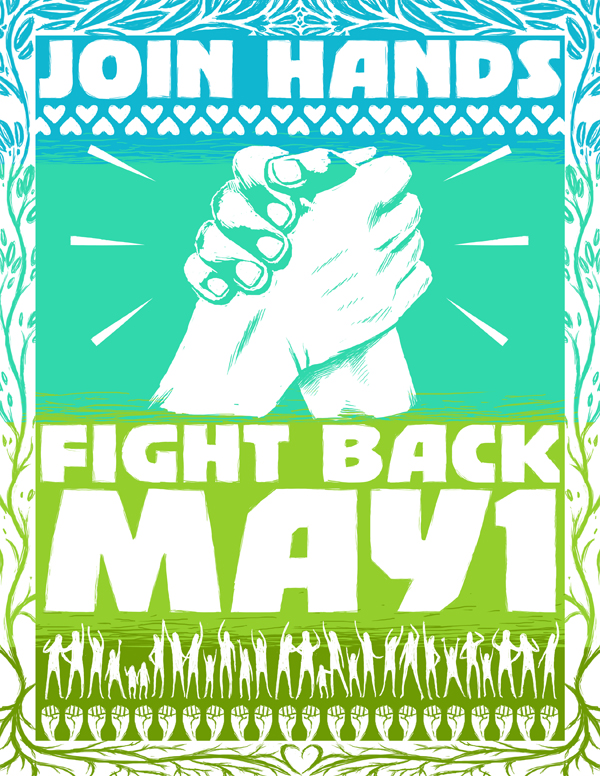Why do we strike on May Day? What is that strike? We strike in solidarity with global labor, our own histories and with each other. The action of striking is not just a withdrawal of labor but what Marina Sitrin calls “striking new relationships.” The actions of refusal to play the part expected of us, in whatever way we can, and imagining other ways of relating to each other are what will constitute a day of generally striking, a striking day.
Let’s review the call for a Day Without the 99 percent:
- No Work: for many there is no need to respond because they have no work. For others, refusing to work is legally impossible or would endanger them too greatly. Those of us who can do so will withdraw our labor in solidarity with the precarity and dangers suffered by those who cannot.
- No School: in Bloombergistan, only 13% of African-American and Latin@ students graduate high school ready for college. Those who make it find that the ticket to employment literally comes with a mortgage: one million people now have student debt of over $100,000 or more. We leave school to insist it is a right not a privilege and, for a day, those of us who can will offer classes freely to all who care to attend to prefigure the learning that is to come.
- No Housework: domestic labor continues to make the world liveable, and as harmonious and possible as it can. The women, children and (some) men who perform that labor have to endure the insult of one percenters like Ann Romney claiming their dignity. We will not engage in this invisible labor for one day in order to reclaim it and to show solidarity with those who are compelled by neoliberalism to act as full-time carers without support, whether for elders, children, the dis/abled or others in need.
- No Banking: here we refuse to participate in the system of financial distribution and exchange that has so impoverished us all and yet has been allowed to carry on as if nothing happened. The financialization of everything and everyone has made it difficult to withdraw entirely from the banking system, as many used to be able to do. We can plan to move our money to credit unions and other co-operatives.
- No Shopping: consumers dictate the success or failure of the one percent. By refusing to shop for things that we do not need, we can show how the concept of permanent growth is unsustainable.
What we will do is more important than what we will not do. We will share ideas, skills, food, music, art, friendship, solidarity and space. We will assert that striking new relationships is living, while working for life is not. Over the course of four months of planning, Occupy has become the autonomous, decentralized movement that was promised in September 2011. The combination of mutual aid, direct action, direct democracy, affinity groups and the free exchange of knowledge and ideas, enabled and facilitated by digital technologies, has changed many lives already. This “internal” process of transformation is now ready to reach out to many others.
Will capitalism fall on May 1? No. But it’s doing a good job of collapsing on its own at the moment. The more we refuse to come to its aid, the quicker that moment may come.
Will cities grind to a halt on May 1? No. Transport workers are not on strike, so that people can easily get to the events and so that those who have no choice but to work can do so.
Will there be more life, more laughter, more music, more creativity, more confrontation, more raising of awareness, more solidarity: in short, more love? Yes, she said, yes, yes, yes.
These new relationships will reconfigure our relationship to U. S. history and to the rest of the world. It was in Chicago in 1886 that May Day strikers called for the eight-hour working day. The demonstration ended with a bomb being thrown that culminated in the notorious Haymarket Affair and the execution of four people, none of whom had been shown to be responsible for throwing the mysterious bomb.
From that event, May Day has become the global festival of labor. For many years, unions in this country have refused to participate in May Day events for fear of being labeled Communists. Now, more than twenty years after the end of the Cold War, labor, immigrants and Occupy activists are coming together to act in solidarity with the global 99%.
Why post this today rather than May 1? Because I will be striking on May 1 in whatever ways I can and it’s not too late for you to think of some way in which you can as well. Please join us.


